Devon Energy Corporation (NYSE:DVN) Looks Interesting, And It's About To Pay A Dividend
Readers hoping to buy Devon Energy Corporation (NYSE:DVN) for its dividend will need to make their move shortly, as the stock is about to trade ex-dividend. Typically, the ex-dividend date is one business day before the record date which is the date on which a company determines the shareholders eligible to receive a dividend. The ex-dividend date is important because any transaction on a stock needs to have been settled before the record date in order to be eligible for a dividend. In other words, investors can purchase Devon Energy's shares before the 14th of March in order to be eligible for the dividend, which will be paid on the 28th of March.
The company's next dividend payment will be US$0.44 per share, and in the last 12 months, the company paid a total of US$2.87 per share. Based on the last year's worth of payments, Devon Energy stock has a trailing yield of around 5.4% on the current share price of US$46.16. Dividends are a major contributor to investment returns for long term holders, but only if the dividend continues to be paid. As a result, readers should always check whether Devon Energy has been able to grow its dividends, or if the dividend might be cut.
See our latest analysis for Devon Energy
Dividends are typically paid from company earnings. If a company pays more in dividends than it earned in profit, then the dividend could be unsustainable. Devon Energy paid out a comfortable 49% of its profit last year. That said, even highly profitable companies sometimes might not generate enough cash to pay the dividend, which is why we should always check if the dividend is covered by cash flow. Over the last year it paid out 72% of its free cash flow as dividends, within the usual range for most companies.
It's positive to see that Devon Energy's dividend is covered by both profits and cash flow, since this is generally a sign that the dividend is sustainable, and a lower payout ratio usually suggests a greater margin of safety before the dividend gets cut.
Click here to see the company's payout ratio, plus analyst estimates of its future dividends.
Have Earnings And Dividends Been Growing?
Companies with consistently growing earnings per share generally make the best dividend stocks, as they usually find it easier to grow dividends per share. If earnings decline and the company is forced to cut its dividend, investors could watch the value of their investment go up in smoke. It's encouraging to see Devon Energy has grown its earnings rapidly, up 40% a year for the past five years.
Many investors will assess a company's dividend performance by evaluating how much the dividend payments have changed over time. Devon Energy has delivered 11% dividend growth per year on average over the past 10 years. It's great to see earnings per share growing rapidly over several years, and dividends per share growing right along with it.
Final Takeaway
From a dividend perspective, should investors buy or avoid Devon Energy? Earnings per share have grown at a nice rate in recent times and over the last year, Devon Energy paid out less than half its earnings and a bit over half its free cash flow. Devon Energy looks solid on this analysis overall, and we'd definitely consider investigating it more closely.
So while Devon Energy looks good from a dividend perspective, it's always worthwhile being up to date with the risks involved in this stock. Every company has risks, and we've spotted 3 warning signs for Devon Energy (of which 1 is significant!) you should know about.
If you're in the market for strong dividend payers, we recommend checking our selection of top dividend stocks.
Have feedback on this article? Concerned about the content? Get in touch with us directly. Alternatively, email editorial-team (at) simplywallst.com.
This article by Simply Wall St is general in nature. We provide commentary based on historical data and analyst forecasts only using an unbiased methodology and our articles are not intended to be financial advice. It does not constitute a recommendation to buy or sell any stock, and does not take account of your objectives, or your financial situation. We aim to bring you long-term focused analysis driven by fundamental data. Note that our analysis may not factor in the latest price-sensitive company announcements or qualitative material. Simply Wall St has no position in any stocks mentioned.

